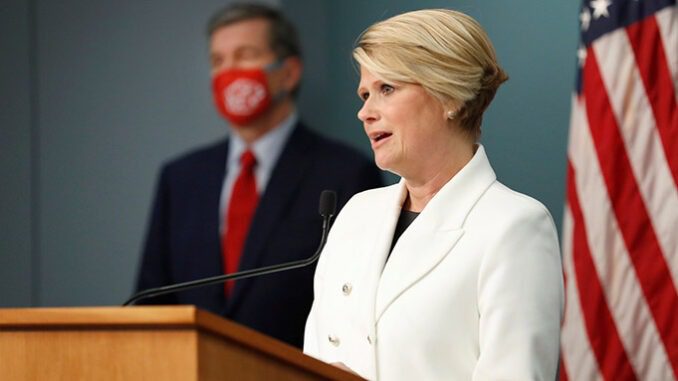
RALEIGH — North State Journal sat down for a check-in with N.C. state Superintendent Catherine Truitt to see how things are progressing in her first year in office.
One of the pieces in Operation Polaris that Truitt touched on was human capital.
“The human capital work continues alongside other efforts to both improve recruitment and retention,” said Truitt. “And then you also have the governor’s Drive Task Force, which is about diversification of the teaching profession, because 80% of the teaching profession in North Carolina is white and female.
“The Human Capital Roundtable, which predates me coming into office, is now the work of PEPSC, the Professional Educator Preparation Standards Commission that sits in legislation,” Truitt said. “And this group within PEPSC is divided into various subcommittees. I serve on the compensation committee.”
Truitt said that they are “looking at new ways to both recruit and retain teachers into the profession without lowering standards that will provide teachers with a pathway to promotion that doesn’t involve going into administration.”
According to Truitt, the recruitment and retention issue “is not just about the quote-unquote teacher pay conversation.”
When asked if DPI was looking at a revamp of the step system for teacher compensation, Truitt said “yes.”
“It’s about not compensating teachers solely for years of experience but competencies demonstrated,” said Truitt. “So, you could be compensated for being a high achieving teacher, through demonstration of competencies and outcomes, you could be compensated more for mentoring and other leadership roles.”
“It’s huge,” Truitt said, “It’s a paradigm shift, because, again, we’re not just paying teachers solely based on the number of years they have in the classroom. No other industry compensates people in that way.”
North State Journal asked what Truitt through about those who might call the change a step towards a merit-based pay system.
“When I think of merit-based, what I think about is test scores and this is not about test scores,” Truitt replied. “In fact, what I would say is that this is all part of what I consider to be something that needs to be done in public education, which leads into the next [Operation Polaris] satellite of testing and accountability.”
Truitt also said there is a need to “redefine school quality.”
“Right now, in North Carolina, we define school quality with an algorithm that looks at 80% achievement and 20% growth,” Truitt said. “There are lots of other ways and other things that we should be looking at to determine whether or not a school is a good quality school.”
Some ways Truitt thinks school quality should be determined include teacher attrition at an individual school and after-school opportunities for enrichment. She also mentioned high school level engagement with community colleges to engage students in career exploration.
“The extent to which they engage parents, should be a metric of school quality,” Truitt said.
“If we’re going to redefine what school quality is, then we have to figure out how we’re going to measure it. And then if we do that, we need to redefine what high-quality instruction looks like,” said Truitt. “And if we’re going to do that, we have to think about how we’re going to measure that, because high-stakes ‘one-and-done testing’ is not the way to measure student learning.”
In terms of how Operation Polaris along with related compensation and testing work this year started and where it is now, Truitt said that “what’s interesting about all of these things is that they require legislation.”
“Operation Polaris is very much an ever-evolving playbook. It can’t be static. It has to be a living document,” said Truitt.
“The literacy piece, we can check that box,” said Truitt “And that’s great, because that was the most important thing that we could have done, both pre-pandemic and post pandemic. There’s no daylight between the two.”
Truitt said that, overall, she is “pleased with the progress that’s been made.”
“In all of the kind of big-picture items or big-ticket items that I ran on — literacy, testing and accountability, a highly qualified teacher in every single classroom — everyone’s pretty much in agreement with prioritizing those things,” said Truitt. “I think there’s bipartisan support there within the education community.”
She added that how certain items get done will be up to the legislature and that legislators were important stakeholders included in their discussions.
“We’re going to get the ball into the end zone, and then it’s going to be up to them,” said Truitt.




